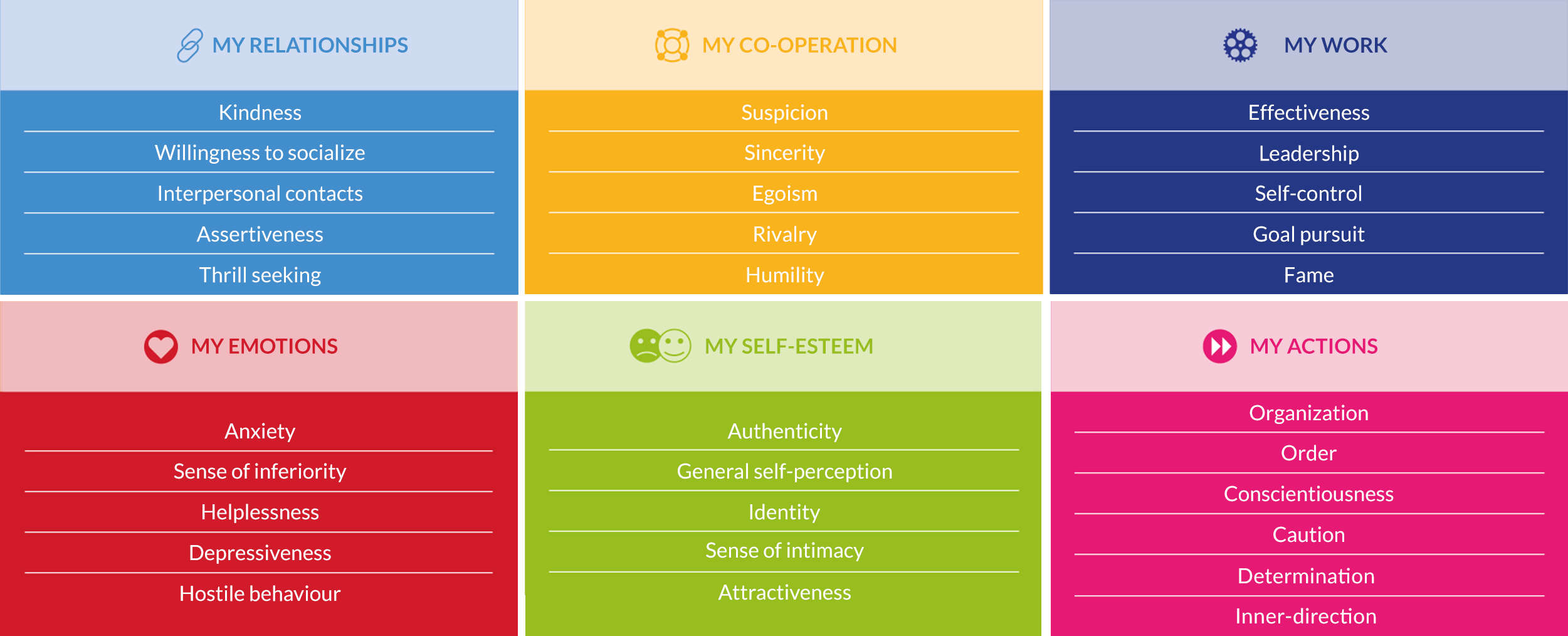
PCT-Y - Profi Competence Test for Young
PCT-Y Test (Profi Competence Test for Young) is the most complex test that examines the potential, self-assessment, emotions, strong sides and areas for development of a learner. It's a multidimensional tool used in personality assessment in relation to multiple areas concerning learning and functioning of a young person in their private life.
PCT-Y is a tool that supports the process of getting to know yourself and the process of setting the direction of learning as well as overall development.
It is recommended for building awareness of personal resources and during the construction of a career path.
The test is based on 6 dimensions and 31 subdimensions:

The test assesses the reactions, behaviours, attitudes, beliefs, strong sides and areas for development.
The comprehensive interpretation of results contains recommendations of specialists and supports setting goals and making decisions at different stages of the tested person's life.
- to build awareness of personal potentia
- to determine the strong sides and areas for development
- to determine the areas of development (choice of schools, trainings, courses)
- to establish professional preferences
- for diagnosis of developmental processes
- to establish an individual development plan
- a model based on the Five Factor Model of Personality developed by Paul T. Costa, Jr. and Robert McCrae as well as Epstein's theory of personality.
- 340 questions with answers arranged on a scale of 0 to 4
- time for completion: about 60 minutes
- normalized tool
- an extremely detailed report (c. 50 pages) available in Polish and English report available immediately after submission of the test.
Pupils / Students for the purpose of getting to know their emotions. Useful in identifying emotions supporting and inhibiting effective action. It verifies the level of anxiety when approaching tough challenges, the level of falling into a state of gloom and giving up in difficult situations, tendency to self-criticise or the internal experience of anger. It supports the establishment of an individual path of self-development.
Career Offices for verification during the recruitment process for the purpose of identifying the level of emotions. Useful in identifying emotions supporting and inhibiting effective action. It verifies the level of anxiety when approaching tough challenges, the level of falling into a state of gloom and giving up in difficult situations, tendency to self-criticise or the internal experience of anger. For the diagnosis of students in terms of entering the labour market.
Lecturers as a tool supporting classes and workshops. Useful during classes, such as, among others: strengthening self-confidence, building up self-worth, coping with strong emotions, teamwork, communication, conflict resolution, resolving difficult situations.
Teachers for individual and group work with students. Useful in identifying emotions supporting and inhibiting effective action. It verifies the level of anxiety when approaching tough challenges, the level of falling into a state of gloom and giving up in difficult situations, tendency to self-criticise or the internal experience of anger. It allows to understand the emotions of students to support their developmental process.
Educationalists for individual and group work with students. It helps to provide a better understanding of a student and to make fuller, empathetic contact with him or her. Useful in identifying emotions supporting and inhibiting effective action. It verifies the level of anxiety when approaching tough challenges, the level of falling into a state of gloom and giving up in difficult situations, tendency to self-criticise or the internal experience of anger.
Psychologists for individual and group work with younger patients. It helps to provide a better understanding of a patient and to make fuller, empathetic contact with him or her. Useful in identifying emotions supporting and inhibiting effective action. It verifies the level of anxiety when approaching tough challenges, the level of falling into a state of gloom and giving up in difficult situations, tendency to self-criticise or the internal experience of anger. It supports the process of diagnosis and planning further therapy.
Coaches for individual work (coaching sessions) and for group coaching with young people. Useful in identifying emotions supporting and inhibiting effective action. It verifies the level of anxiety when approaching tough challenges, the level of falling into a state of gloom and giving up in difficult situations, tendency to self-criticise or the internal experience of anger. It supports the process of getting to know a young person and defining coaching goals.
Career advisors for individual and group work. It allows to diagnose the emotionality of a young person in order to establish their strengths during the pursuit of a career path. It verifies the level of anxiety when approaching tough challenges, the level of falling into a state of gloom and giving up in difficult situations, tendency to self-criticise or the internal experience of anger. It supports the establishment of an individual direction for self-development and constructing a professional career path.
Parents for getting to know the strong sides and areas for development of their child. It enables the diagnosis of the emotionality of a young person. It verifies the emotions that support and inhibit effective action. It establishes the level of anxiety when approaching tough challenges, the level of falling into a state of gloom and giving up in difficult situations, tendency to self-criticise or the internal experience of anger. Useful in understanding the emotions of a young person and in establishing an individual direction for development.
PCT-Y - a multidimensional questionnaire used to diagnose the personality of 14-19 year olds.
Description: The questionnaire investigates six dimensions (scales) and 31 sub-dimensions (factors). It consists of 340 statements of a self-descriptive nature, to which the respondents refer on a five-point scale from "I completely disagree" through "I have no opinion" to "I completely agree".
Reliability: Measured by Cronbach's alpha coefficient. The overall internal consistency coefficient is 0.81
Relevance: Factor analysis was used to examine the relevance of the test. Using a donkey chart, it was determined that the statements in the test were best divided into 6 groups. In this way, six scales were determined and their empirical factor affiliations were established.
Normalisation: Sten scores were determined on the basis of a sample of 2,563 individuals differing by sex, age and place of residence. They were determined in one age group, independently for men and women.